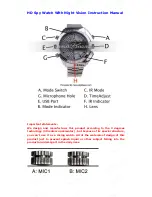
55
54
• If moisture has entered the watch, or if the inside of the crystal is fogged up
and does not become clear within a day, immediately take the watch to your
dealer or Citizen Service Center for repair. Leaving the watch in such a state
will allow corrosion to form inside.
• If seawater enters the watch, place the watch in a box or plastic bag and
immediately take it in for repair. Otherwise, pressure inside the watch will
increase, and parts (crystal, crown, buttons, etc.) may come off.
CAUTION:
Keep your watch clean.
•
Dust and dirt tend to be deposited in gaps in the back of the case or band.
Deposited dust and dirt may cause corrosion and soil your clothing. Clean the
watch occasionally.
Cleaning the Watch
•
Use a soft cloth to wipe off dirt, perspiration and water from the case and
crystal.
• Use a soft, dry cloth to wipe off perspiration and dirt from the leather band.
• To clean a metal, plastic, or rubber watchband, wash away dirt with mild soap
and water. Use a soft brush to remove dust and dirt jammed in the gaps in the
metal band. If your watch is not water-resistant, take it to your dealer.
• Water-resistance for daily use (to 3 atmospheres): This type of watch is water-
resistant to minor exposure to water. For example, you may wear the watch
while washing your face; however, it is not designed for use underwater.
• Upgraded water-resistance for daily use (to 5 atmospheres): This type of
watch is water-resistant to moderate exposure to water. You may wear the
watch while swimming; however, it is not designed for use while skin diving.
• Upgraded water-resistance for daily use (to 10/20 atmospheres): This type of
watch may be used for skin diving; however, it is not designed for scuba or
saturated diving using helium gas.
CAUTION
•
Do NOT operate the crown or button with wet fingers or when the watch is
wet. Water may enter the watch and compromise water-resistance.
• If the watch is used in seawater, rinse with fresh water afterward and wipe with
a dry cloth.



































